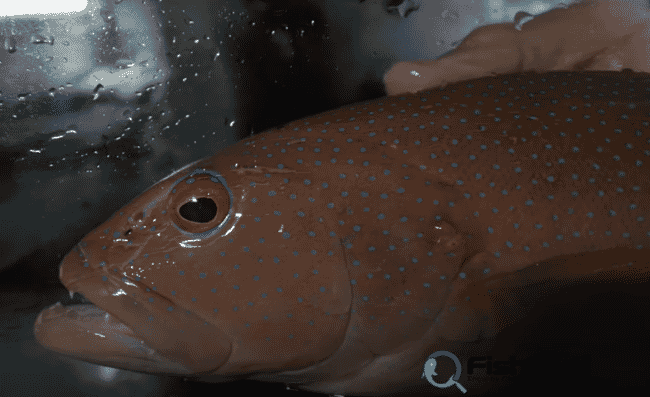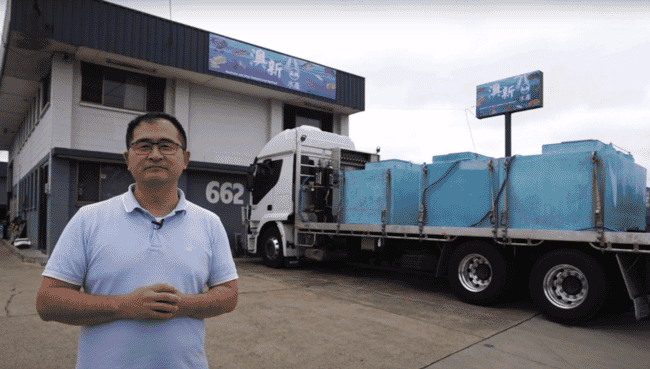
This is particularly important for the live fish trade as it makes it possible to trace each individual fish without the need to tag them
Coral trout have traditionally been wild caught on Australia’s Great Barrier Reef. Fishers use handlines with single hooks to avoid getting snagged on the reef, making it the most sustainable way of fishing.
Due to shortages of wild stocks and high prices, attempts at coral trout aquaculture started 20 years ago, both in Asia and Australia, but without commercial success. However, everything changed in 2015, when farms in China began selling farm raised coral trout. This new development provided a constant supply of fish and eliminated price spikes due to fish shortages. In the Philippines, the industry was further complicated by stocking wild caught juveniles into sea cages and calling them “farm raised”. The debate about which tastes better – wild or farmed fish – continues today.
The variety of ways that coral trout – traditionally sold live – reach the consumer has led one live fish transport expert to develop an innovative tool to ensure that each fish is traceable, thereby reducing seafood fraud.
“With our goal to help the fishermen, International Live Seafood Transport has developed an exciting innovation to move the industry forward, ‘FishBioID AI’ technology,” explains Edmond Wong, CEO of ILST FishBioID AI and president of the Queensland Live Fish Trade Association.
Customer perception is that live wild caught fish are superior in taste and texture to their farmed cousins. Currently, there is no way a restaurant customer paying a premium fish price can tell if it is cultured or wild caught. As the farming of marine fish improves, this may change.

According to Wong, FishBioID AI can accurately prove the source of the fish. It works with live, fresh, and frozen, but it suits live fish best. Fish origin can be determined using AI software and hardware.
Farmers and fishers record the markings of their coral trout using FishBioID hardware. Additionally, customers can use the FishBioID AI App to take a picture in the restaurant or the shop and get its origin results in seconds. FishBioID AI currently only works for coral trout, which have spots like fingerprints, with no two fish identical.
An algorithm pairs the spots on a customer’s fish with those sold by the farmer or fishers – those with at least 11 matching pairs will indicate a match.
“We can identify coral trout with reasonable accuracy as either farmed raised or wild caught. Data (day of catch, who caught the fish and where, the boat, exporter, and importer) is collected and retrievable. It’s a complete chain of custody. Best of all, satisfied restaurant customers can even tip the specific hardworking fishers directly,” says Wong.
Aquacultural applications
While the technology was invented with fishers in mind – to build their brand and get a premium for their produce – it also has scope to be used by coral trout farmers.
“Farms can establish the fish source and differentiate their fish from other farms and wild-caught stock. They can use the technology as a brand building tool. It all comes down to the cost of obtaining the IP, which is currently too expensive with Worldwide IP. We will begin with Australia first and have our IP examined. If it is workable, we will roll out the IP to all interested Asian countries,” explains Wong.
Wong intends to launch the technology early this year.
“Customers download and use the free App. There will be a stand located inside the restaurants for taking photos. Portable hardware will be available on the boats, in the export facility or at the farm, and a fish registration App will be free to the boat skippers and exporters,” Wong explains.
“It is exciting that technology can add value to existing industries like the live reef food fish trade and aquaculture. ILST and FishBioID AI will continue innovating and developing new products to benefit farmers, fishers and consumers,” he adds.
And Wong also has plans to develop the technology for a range of species.
“It’s now important to train FishBioID AI to find the uniqueness of other wild caught and farm raised stocks. The technology can be applied to research, catch and release, and broodstock tagging,” he concludes.
Further information
Edmond Wong is a professional with over 20 years of business management experience. He is CEO of ILST Pty Ltd and FishBioID Pty Ltd, and president of the Queensland Live Fish Trade Association. He is a specialist in transporting live seafood internationally and can be contacted via edmond@ilst.solutions



